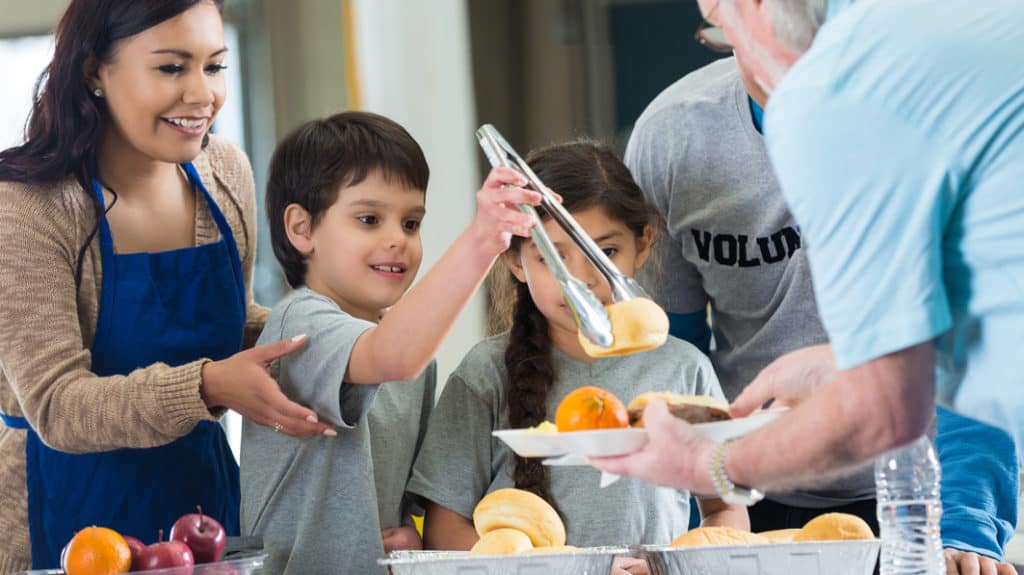“Mom, did he sleep there last night?” my daughter asked as we drove by a man sitting under a bridge and wearing several layers of old clothes.
“I’m not sure, but it looks like it.”
As children enter the tween years, they begin to notice the world around them and start to see some of the complexities of larger social issues. Their observations and curiosity spike, and they gain empathy for people in different circumstances. As a result they may ask specific questions about homelessness, such as, “Is that all of her stuff?” “Doesn’t he have a family?” “Isn’t he cold at night?” “Why don’t you give her some money?”
Those questions present opportunities to guide our children during this developmental stage. When we engage our tweens with words and actions, we can show them what it means to love our neighbors (Luke 10:30-37).
Starting the conversation
Many living on the streets are there because of mental illness, addictions, and poverty. These are all larger concepts that tweens are able to begin understanding.
“Don’t they have any family?” my tween asked. “Don’t they have anyone to take care of them?”
“They might,” I told her. “We don’t know their story, but they might have people who love them very much. Sometimes the destructive decisions or illnesses people have that put them on the streets also destroy their relationships. Drug and alcohol addiction can make people do things they wouldn’t do if they were sober. This could lead to them losing their job, their home, and even the relationships with people who love them.”
I knew this would give my daughter something to ponder, and I wanted her to know the truth of what she was seeing — but I also wanted to frame it in a loving way.
Talking about homelessness is important in helping our children understand what they observe and why. Start with big ideas and broad definitions and let your tweens, through their questions, direct the specifics of where your conversations go. This way you give them what they need to know without overwhelming them with specifics they aren’t ready for. I’ve found the following to be essential when my tweens broach the subject.
Don’t be afraid to introduce difficult topics
I recently had this conversation with my tween daughter:
“Mom, how do they have money for food?”
“I’m not sure. Maybe they go to the rescue mission for their meals. Or maybe they dumpster dive. People get creative when they’re desperate.”
“What does that mean?”
“ ’Dumpster diving’ is when you look in the trash, or dumpster, for things other people have thrown away that you can use.”
I could get into grittier topics about how people get creative when desperate, which I know are part of the reality of life on the streets. Drugs, prostitution and “survival sex” — exchanging sex for protection, food or shelter — are all part of the larger underground street economy. But I’ll wait until their teenage years to introduce those topics; unless, of course, they ask about them. Then we’ll carefully and with sensitivity dive in.
As parents let’s not shy away from these conversations, but tackle real-life subjects with a tone of care and concern for those involved.
Watch your language
When talking to your tween, consider referring to the homeless as our “friends on the streets” or “our brothers and sisters.” It reminds children of each individual’s personhood within their circumstances. Then avoid making assumptions about someone’s specific situation. Though we do know common causes of homelessness, we don’t know each person’s story. Instead, emphasize the individual person and journey, which points to his or her unique God-given identity.
Be honest
Tweens have a strong sense of justice and often want to know why God doesn’t intervene in difficult circumstances. As you delve into these larger topics, share your own feelings and questions. Be willing to say, “I don’t know” when you don’t have an answer for your child.
If you have a policy of not giving money to those asking for it, explain why and say how you do care for this population. Having a thought-out family plan about your approach to giving takes away the awkward tension in the moment you are approached and allows you to answer your children’s questions without hesitation.
Act together
As tweens develop a sense of compassion toward the homeless, they often want to move beyond just a discussion and do something. This is a great opportunity for you to act together.
Because my husband’s job is working with the formerly homeless population, we spend time with people who are in the process of rebuilding their lives. We’ve found that building relationships with real people makes the issue of homelessness personal to our tweens. They can understand and care about the homeless more when they connect the population to a person they actually know.
When we offer practical help and give our time, talent and treasure on behalf of the homeless, we are often most effective when we partner with service providers and ministries already working on the streets. They know the culture and the needs.
Here are some ways I’ve found to better focus our actions as a family:
- Set a plan. A family plan lays out how you will help support those who are homeless. But first you must determine your beliefs about charity, because your approach will stem from those. Do you want to help meet people’s immediate physical needs (mercy) or combat systems that create homelessness (justice)? Discuss your plan with your kids so they know where you stand and why.
- Volunteer or visit. Tweens are at an age where they can volunteer with Mom and Dad at a soup kitchen, shelter or transitional home, have supervised contact with the homeless, or formerly homeless population, and actually be helpful in the work they offer. Sometimes it’s more appropriate for kids to help behind the scenes, though, such as in food preparation, childcare or restocking shelves.
- Collect and donate. Another type of work behind the scenes is focused on helping organizations receive necessary supplies. Ask these organizations what items they need (because we don’t want to burden them with stuff they don’t). From coats, socks or gloves, to nonperishable, ready-to-eat food, to hygiene products, collecting tangible items helps tweens who are concrete thinkers feel part of the solution.
- Model dignity. Whether stopped at a stoplight or volunteering together at a “clothes closet,” your tweens watch as you treat others with respect and dignity. Even if you don’t plan to give money, acknowledge someone’s presence by making eye contact, smiling and giving a friendly nod. When engaged in conversation, ask questions of the person that indicate he or she is more than their immediate circumstances. “Where did you grow up?” “What’s your favorite breakfast?” “Did you serve our country?” can open for two-way connection.
- Pray. Our tweens’ growing ability to see life from others’ perspectives positions them to pray on others’ behalf. Include praying for homeless neighbors during regular family prayer time or in the car when passing someone or when stopped at a light. Thank God for that person and ask for His protection and provision in their life.
When my family and I see someone, I suggest, “Let’s pray for him right now.” And amid the occasional eye rolls from my tweens, I pray for the person we just passed: “Lord, protect her today. Keep her safe. Comfort her. And help her find a warm place to lay her head. Amen.”
When we guide our tweens on how to think about, act toward, and pray for the homeless, we create within them a sense of understanding and compassion for those whom God loves just as much as He loves us.
Alexandra Kuykendall is the author of Loving My Actual Life.
























